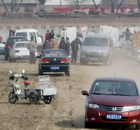-
-
China Daily E-paper
Web Comments
Rio Tinto fallout can only hurt Australia
By Wang Hui (chinadaily.com.cn)
Updated: 2010-04-02 16:28
 |
Large Medium Small |
The British-Australian iron ore giant Rio Tinto is probably a household name now in China. But such a sudden fame may not bear positive results in the long run, especially on the people-to-people level.
The months-long dispute between China and Australia over China's arrest and trial of four Rio Tinto employees have captured intense media attention on both sides. Media in Australia, despite their usual partisan divide, have almost spoken in one voice on this matter, accusing China of a worsening business environment, even pointing fingers at its political and legal systems.
The verdicts given by the Shanghai court to the four employees on March 30 did not put an end to the dispute, but aroused even more dissatisfaction with China from Australian media and politicians. Turning a blind eye to the fact the Chinese court is fully justified to conduct part of the court hearing behind closed doors as it concerns commercial secrets, Australian Prime Minister Kevin Rudd said he has serious questions about the verdicts.
| ||||
These irresponsible Australian remarks have stemmed from the deep-rooted bias against China. It is groundless and ridiculous for Australians to take for granted that the trial could not be a fair one simply because China has a different legal system. The legal system in China has guaranteed the social stability and social justice of 1.3 billion Chinese people at large. Its fairness and dignity should not be undermined.
Australian media and politicians should instead feel ashamed of their legal system's failure in guaranteeing even the safety of thousands of Indian and Chinese students in Australia.
Such bias and arrogance against China from the Australian side as reflected in the Rio Tinto case could only sow the seeds of distrust and arouse indignation among Chinese people. Through the Rio Tinto case, more Chinese begin to see the real face of Australia.
In the past, the mere mention of Australia would remind Chinese of the good aspects of the country, such as its stunning natural environment and its quality school education. They would love to go there for sightseeing or send their kids there for a better education as they believe our two countries hold a friendly relationship.
Now the lasting anti-China sentiments in Australia will make many Chinese change their friendly attitude toward the country, even if it is home to such lovely animals as koalas and kangaroos.
True, business will continue as usual for the time being as the two economies are highly complementary. Even if the price of iron ore has gone up hugely in the wake of the Rio Tinto case, hungry Chinese steelmakers with a bulging wallet still need to turn to Australia for raw materials.
However, the hurt in Chinese people's feelings will take years to heal. Eventually, the country in the southern hemisphere will turn out to be the biggest loser, as sooner or later it will feel the backlash in such aspects as dwindling Australia-bound Chinese tourists and students. Such a result is not alarmist talk as Chinese people are well known for their nationalism among Westerners?- what we call patriotism.













